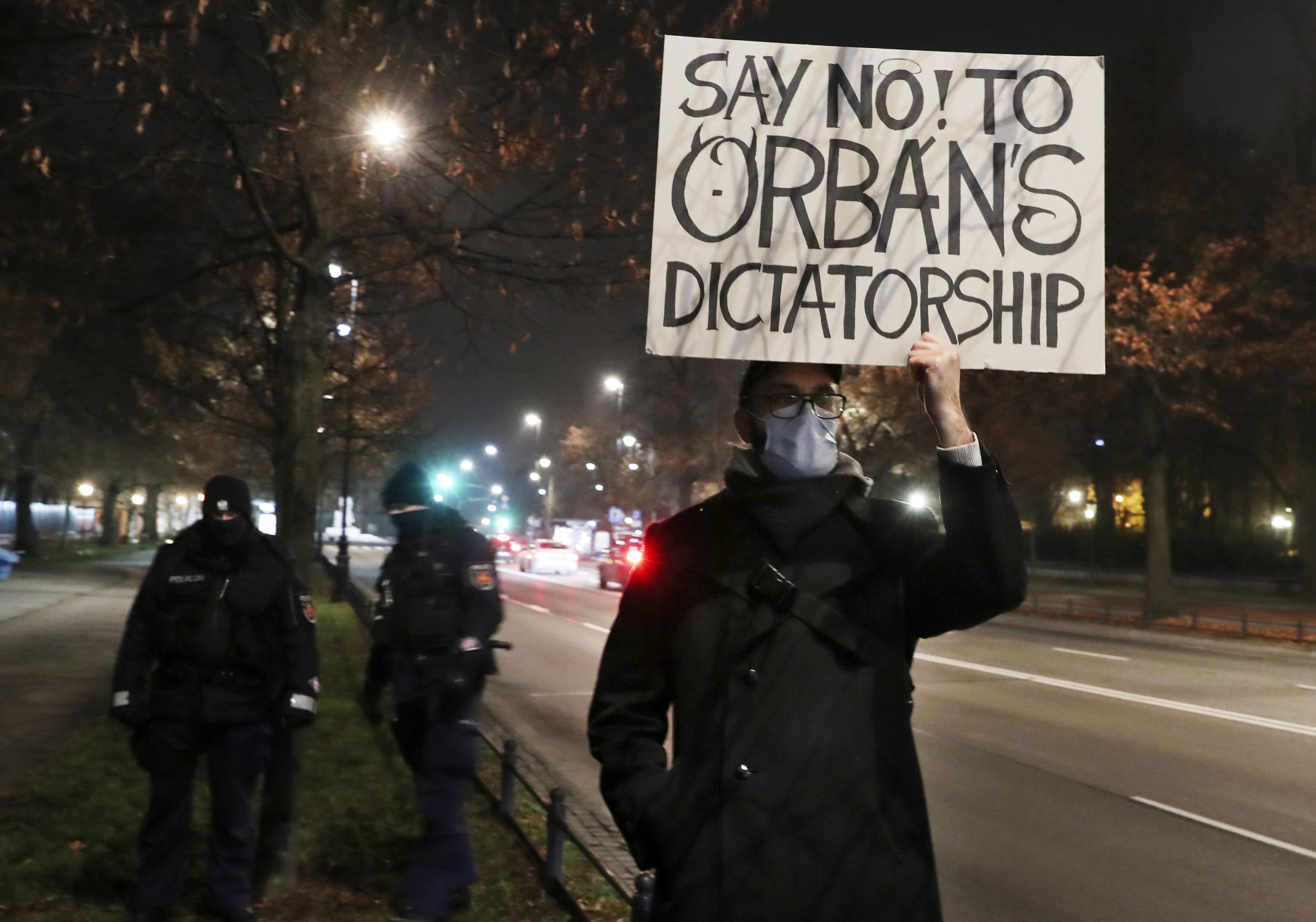Authoritarianism advances as world battles the pandemic By JILL LAWLESS a few seconds ago

LONDON (AP) — Here’s some of what happened while the world was distracted by the coronavirus: Hungary banned the public depiction of homosexuality. China shut Hong Kong’s last pro-democracy newspaper. Brazil’s government extolled dictatorship. And Belarus hijacked a passenger plane to arrest a journalist.
COVID-19 has absorbed the world’s energies and isolated countries from one another, which may have accelerated the creep of authoritarianism and extremism across the globe, some researchers and activists believe.
“COVID is a dictator’s dream opportunity,” said Theary Seng, a Cambodian-American human rights lawyer who has been indicted on charges including treason in the ostensibly democratic southeast Asian nation, where Prime Minister Hun Sen has been in power for more than three decades.
Human Rights Watch accuses Cambodia’s government of using the pandemic as cover to imprison political opponents without due process. Scores have been indicted and face mass trials.
ADVERTISEMENT
When it comes to government opposition, “the fear of COVID, on its own and as a political weapon, has substantially restricted mobility for a gathering or movement to take shape,” Seng said.
The biggest global public health emergency in a century has handed power to government authorities and restricted life for billions of people.
Luke Cooper, a London School of Economics researcher and author of the book “Authoritarian Contagion,” said the vast economic, health and social resources poured into fighting the pandemic mean “the state is back as a force to manage society and to deliver public goods.”
Restrictions on civil liberties or political opponents have been stepped up during the pandemic on several continents.
For a decade in Hungary, conservative nationalist Prime Minister Viktor Orban has curtailed media and judicial freedom, criticized multiculturalism and attacked Muslim migrants as a threat to Europe’s Christian identity.
During the pandemic, Orban’s government brought in an emergency powers bill allowing it to implement resolutions without parliamentary approval — effectively a license to rule by decree. In June, it passed a law prohibiting the sharing of content portraying homosexuality or sex reassignment with anyone under 18. The government claims the purpose is to protect children from pedophiles, but it effectively outlawed discussion of sexual orientation and gender identity in schools and the media.
Poland’s conservative government has chipped away at the rights of women and gay people. A ruling last year by a government-controlled court that imposed a near-total ban on abortion triggered a wave of protests that defied a ban on mass gatherings during the virus outbreak.
ADVERTISEMENT
In India, the world’s biggest democracy, populist Prime Minister Narendra Modi has been accused of trying to silence voices critical of his administration’s response to a brutal pandemic wave that tore through the country in April and May. His government has arrested journalists and ordered Twitter to remove posts that criticized its handling of the outbreak after introducing sweeping regulations that give it more power to police online content.
Even before the pandemic, Modi’s ruling Hindu nationalist Bharatiya Janata Party was accused by opponents of squashing dissent and introducing policies aimed at refashioning a multifaith democracy into a Hindu nation that discriminates against Muslims and other minorities.
In Russia, the government of President Vladimir Putin has used the pandemic as its latest excuse to arrest opposition figures. Associates of jailed opposition figure Alexei Navalny have been subjected to house arrest and charges that the mass protests against his arrest violated regulations on mass gatherings.
In neighboring Belarus, authoritarian President Alexander Lukashenko extended his quarter-century iron grip on power by winning an August 2020 election that the opposition — and many Western countries — said was rigged. The huge protests that erupted were met with tear gas, rubber bullets and mass arrests.
Then, in May, a Ryanair plane flying from Athens to Vilnius was forced to land in the Belarusian capital of Minsk after the crew was told of an alleged threat. Opposition journalist Raman Pratasevic, a passenger, was taken off the plane along with his girlfriend and arrested.
Western nations called the forced diversion a brazen hijacking and slapped sanctions on Belarus, but those seem unlikely to induce Lukashenko to change his ways and underscore the weakness of democracies in confronting hardline regimes. Hungary’s acts have drawn sharp words from fellow European Union leaders, but the 27-nation bloc has no unified response to restrictive regimes like those in Hungary or Poland.
Even before COVID-19 came along, extremism was on the march.
“Over the last 15 years, authoritarian politics has replicated all over the world,” Cooper said. “Democracy feels very fragile. Democracy doesn’t have a clear vision for what it’s trying to do in the 21st century.”
The 2008 global financial crisis, which saw governments pump billions into teetering banks, shook confidence in the Western world order. And the years of recession and government austerity that followed boosted populism in Europe and North America.
In China, authorities saw the 2008 economic crash as evidence that they, and not the world’s democracies, were on the right path.
Historian Rana Mitter, director of the University of Oxford China Center, said the crisis persuaded China’s communist government that “the West no longer had lessons to teach them.” Since then, Beijing has increasingly flexed China’s economic muscle abroad while cracking down on opposition inside its borders.
In recent years, hundreds of thousands of Muslim Uyghurs have been confined in re-education camps in China’s western Xinjiang region, where activists and former detainees accuse authorities of imposing forced labor, systematic forced birth control and torture. Beijing instead characterizes the camps as vocational training centers.
Beijing also has tightened control on Hong Kong, stifling dissent in the former British colony. Protesters, publishers and journalists critical of Beijing have been jailed and the last remaining pro-democracy newspaper, Apple Daily, stopped publishing in June after the arrest of its top editors and executives.
When the coronavirus first emerged in the Chinese city of Wuhan, authorities responded firmly — though far from transparently — with draconian lockdowns that got the virus in check.
Mitter said the pandemic has cemented a view — among many ordinary Chinese, as well as the country’s leaders — “that something had gone very wrong in terms of the way in which the democratic world had dealt with the virus, and something had gone right in China.”
“That is now being used very much as a lesson, not just about the pandemic, but about the virtues of China’s system as opposed to the systems of liberal countries,” he said.
Last year, curfews and travel restrictions also became commonplace across Europe. People in France needed to show a signed declaration to travel more than 1 kilometer (just over a half-mile) from home. And Britons were banned by law from going on vacation abroad, while some attendees at a London vigil for a murdered woman were arrested for gathering illegally.
British lawmakers have expressed concern about the scope of the Conservative government’s emergency powers, many passed without debate in Parliament.
“Since March 2020, the government has introduced a large volume of new legislation, much of it transforming everyday life and introducing unprecedented restrictions on ordinary activities,” said Ann Taylor, an opposition Labour Party politician who chairs the House of Lords Constitution Committee. “Yet parliamentary oversight of these significant policy decisions has been extremely limited.”
Politicians and intelligence agencies in the West also have warned of the threat from coronavirus conspiracy theories that dovetail with existing extremist narratives. Many countries have seen large anti-lockdown, anti-mask, anti-vaccine protests attended by a mix of the far right, the far left and assorted conspiracists.
The British government has warned of “extremists exploiting the crisis to sow division and undermine the social fabric of our country,” with different hate groups variously blaming Muslims, Jews and 5G phone technology for the pandemic.
But there are signs of fighting back. The pandemic also has boosted trust in scientists and spurred demands for more accountable political leadership.
In Hungary, which has one of the world’s highest per-capita coronavirus death rates, there is growing opposition both to the government’s pandemic policies and to its wider authoritarian thrust, and thousands have taken to the streets in support of academic freedom and LGBT rights. With an election due in 2022, a six-party opposition coalition has united to try to unseat Orban’s Fidesz party.
Both extremism and resistance can be seen in Brazil, where the far-right President Jair Bolsonaro has expressed nostalgia for the country’s two-decade military dictatorship and last year attended protests against the country’s courts and Congress. He dismissed the virus as a “little flu,” cast doubt on the effectiveness of vaccines and opposed social and economic restrictions.
Renato Meirelles, director of Brazilian polling company Locomotive Institute, said authoritarianism had advanced through “a strategy of fake news and attacks on factual truth.” “The next step will be questioning the electronic vote and, as such, the result of the next election,” he said.
Bolsonaro has so far been held in check by Brazil’s institutions, especially the Supreme Court, which stopped him from preventing states and cities from implementing restrictions to curb COVID-19 and has ordered an inquiry into the government’s pandemic response. And protests have finally spilled out onto the streets. Twice over the past month, demonstrators marched in dozens of cities across the country.
“I’m here to fight for the rights of those in need, for the rights of my children, for my right to live, to have vaccines for all,” said Claudia Maria, a protester in Rio de Janeiro.
In the United States, President Joe Biden has veered away from the populism of Donald Trump, but a Republican Party radicalized by the former president’s supporters has every chance of winning power again.
Cooper, of the LSE, said the authoritarian tide was unlikely to recede soon.
“This is a struggle between democracy and authoritarianism that’s going to last decades,” he said.
___
Associated Press Writers Jim Heintz in Moscow, Justin Spike in Budapest, David Biller in Rio de Janeiro, Christopher Bodeen in Beijing, Sheikh Saaliq in New Delhi and Grant Peck in Bangkok contributed.

